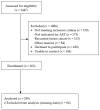Causal Attributions in Breast Cancer Patients Planning to Undergo Adjuvant Endocrine Therapy
- PMID: 34073064
- PMCID: PMC8198340
- DOI: 10.3390/ijerph18115931
Causal Attributions in Breast Cancer Patients Planning to Undergo Adjuvant Endocrine Therapy
Abstract
The aim of this study was to explore causal attributions among Korean breast cancer patients who were planning to undergo adjuvant endocrine therapy (AET) as well as the relationships between patient demographic and clinical characteristics and their causal attributions. Causal attributions were assessed with an open-ended response item, which asked patients to list what they thought were the three most important causal factors of their illness. The relationships between patient characteristics and causal attributions were determined through univariate analysis, and the relationships between causal attributions were obtained using social network analysis. A total of 299 participants provided 707 responses. Stress, diet, and exercise were believed to be the three most likely causes of breast cancer. There were no significant differences between causal attributions and the age, education level, marital status, or cancer stage of patients. However, there were differences in the associations between personality, genetics, and reproductive history and patient-identified causal attributions according to the patients' family history of cancer. Patients with a family history of cancer were more likely to believe that personality and genetics/family history were causes of breast cancer compared to patients without such a history. Therefore, it is necessary to educate patients to perceive stress and lifestyle-related factors as modifiable causal factors in order to have a positive effect on their adherence to AET.
Keywords: breast neoplasm; causality; perception.
Conflict of interest statement
The authors declare no conflict of interest.
Figures




References
-
- 2018 Trend Analysis of Cancer Incidence in Korea. [(accessed on 1 February 2021)]; Available online: https://www.cancer.go.kr/lay1/S1T639C640/contents.do.
-
- Fisher B., Jeong J.-H., Bryant J., Anderson S., Dignam J., Fisher E.R., Wolmark N. Treatment of lymph-node-negative, oestrogen-receptor-positive breast cancer: Long-term findings from National Surgical Adjuvant Breast and Bowel Project randomised clinical trials. Lancet. 2004;364:858–868. doi: 10.1016/S0140-6736(04)16981-X. - DOI - PubMed
Publication types
MeSH terms
LinkOut - more resources
Full Text Sources
Medical

